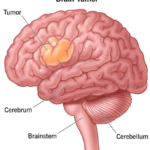Brain Tumor – Warning signs – not all brain tumors are malignant. Some can be non-cancerous. It can start either in the brain, or cancer elsewhere in the body can spread to the brain.
Brain tumor is an abnormal growth of the brain cells. The extra growth inside the brain can exert pressure on the skull, causing life-threatening complications. However, not all brain tumors are malignant. Some can be non-cancerous, benign or harmless masses of cancerous cells that mainly target the structural tissue of the brain. It can start either in the brain, or cancer elsewhere in the body can spread to the brain.


According to WHO guidelines brain tumors are categorized into four grades based on the intensity and abnormality of the cells.
• GRADE 1: Cells look benign and grow slowly; survival of the patient is likely.
• GRADE 2: Cells look slightly abnormal. The tumor grows slowly and may spread to other tissues.
• GRADE 3: Cells look abnormal. The tumor grows aggressively and tends to recur.
• GRADE 4: The cells look abnormal and spread quickly. Tumour could be life-threatening.
Warning signs and symptoms of brain tumor
Depending on the type, location, and stage of the tumor, it can cause both physical and mental symptoms. Some of the commonly observed signs and symptoms of brain tumors are:
Unusual headache – Headache can be a common symptom. If someone is experiencing an unusual headache, especially a new one that feels localized to a specific part of the head it could be an early indication of a brain tumor. The headache tends to be more severe in the morning. A brain tumor increases the pressure inside the skull, which can lead to inflammation and tissue damage. Hence, severe, persistent headaches can occur. If there are changes in the frequency or intensity of the headaches, one must consult a doctor.
Seizures – They are one of the most common symptoms of brain tumors. The seizures occur when the brain’s normal patterns of electrical impulses are disrupted. It is reported that brain tumor-related epilepsy (BTE) is common in low- and high-grade gliomas. The risk of seizures varies between 60% and 100% among low-grade gliomas and between 40% and 60% in glioblastomas.
Memory loss, Speech difficulties and hearing loss – Brain tumors can affect the stages of creating, storing and recalling of memory. Retrograde amnesia, a state where one can’t recall memories that were formed before the event that caused the amnesia and anterograde amnesia, where one can’t form new memories after the event that caused the amnesia can occur in people with brain tumor. A brain tumor can affect the communication capabilities of a person and can cause difficulties in uttering or producing sounds, finding the correct word, and understanding what others are saying. It can also have an impact on reading and writing. Also, the pressure exerted by a tumor on surrounding nerves may cause hearing loss and imbalance.
Weakness in the hands and legs – Weakness or numbness in the face, arms or legs is a common occurrence in brain tumors. It is caused by brain tumors located in the frontal lobes or the brainstem. Weakness in one foot/leg or both feet/legs can cause difficulty in walking. Hence, one may experience loss of balance while walking.
Sudden shifts in mood or personality – Mood changes are commonly associated with brain tumors located in the frontal lobe. This part of the brain is highly involved in regulating personality and behaviour and it also helps controls a person’s behavior and emotions. Sudden mood change can be seen in persons whose pituitary gland has been affected by tumors. It can cause the gland to under-or overproduce hormones, leading to an hormonal imbalance. Getting to know about one’s diagnosis of brain tumor can greatly affect the mental and emotional state.
When to see a doctor?
The above symptoms are a clear indication that one must immediately seek medical help. Upon diagnosis and conducting a range of neurological tests, your doctor will be able to identify and tell you what’s causing the symptoms. If diagnosed with a tumor, one can identify the types and follow the doctor’s advice. Always remember that early diagnosis and treatment are important to help prevent the tumor from growing.


Dr. Ravi Gopal Varma
Neurosciences, Bengaluru











